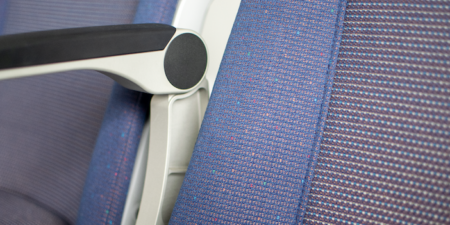SABIC has launched a bio-based Ultem resin that it claims will offer sustainability benefits while maintaining the performance and processability properties of current Ultem high-performance thermoplastics. The company says that these polyetherimide (PEI) materials are the first range of the certified renewable high-performance, amorphous polymers to be developed, and they are suitable for use in aircraft interiors applications such as panels and trim.
SABIC is using a mass balance approach for the polymers, which means that for every 100kg of Ultem resin produced, SABIC replaces 25.5kg of fossil-based feedstocks with bio-based materials derived from waste or residue, such as crude tall oil from the wood industry.
“Because these products perform in the same way and maintain the same regulatory listings – such as UL94 and FDA food contact – as traditional Ultem resins, adjustments to product designs and manufacturing processes are not required,” explained Scott Fisher, director of business management for Ultem resins and additives at SABIC. “Also, customers can be confident about the environmental benefits of these materials, which have earned the ISCC+ designation.”
SABIC says these bio-based ULTEM resins can potentially reduce a carbon footprint by up to 10% compared to fossil-based incumbent grades, giving the material the International Sustainability and Carbon Certification Plus (ISCC+) designation that Fisher mentions. This conclusion was based on an internal evaluation that followed the general principles of lifecycle analysis according to ISO 14040/14044 protocols.
SABIC used its own primary data, combined with the latest manufacturing data and industry average estimates, in the cradle-to-gate comparison of these resins. The bio-based Ultem resins also comply with the requirements of REACH regulation and the Restriction of Hazardous Substances (RoHS) directive.
“The bio-based feedstocks used in the new Ultem materials do not alter performance properties, which include long-term high-temperature performance, chemical resistance, excellent mechanical and structural properties, dimensional and hydrolytic stability, excellent processability and inherent flame retardance,” said Greg Stoddard, SABIC’s director of technology & innovation. “With the same reliable mechanical properties as their fossil-based counterparts, bio-based Ultem grades can be considered as an alternative material to traditional Ultem resins or sulfone polymers such as PSU, PESU and PPSU.”





